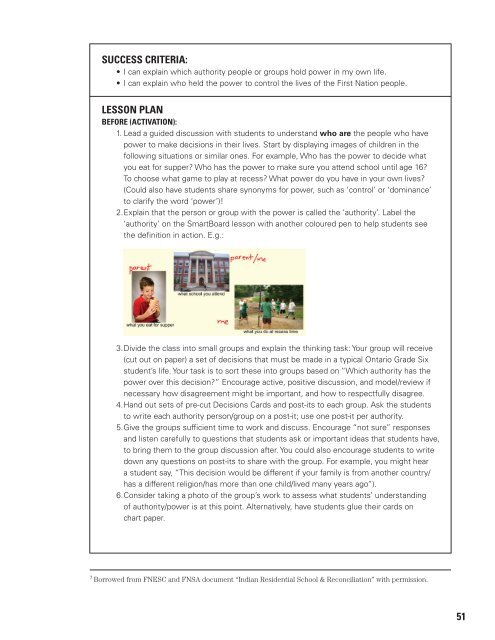Residential Residential
Residential_School
Residential_School
You also want an ePaper? Increase the reach of your titles
YUMPU automatically turns print PDFs into web optimized ePapers that Google loves.
SUCCESS CRITERIA:<br />
• I can explain which authority people or groups hold power in my own life.<br />
• I can explain who held the power to control the lives of the First Nation people.<br />
LESSON PLAN<br />
BEFORE (ACTIVATION):<br />
1. Lead a guided discussion with students to understand who are the people who have<br />
power to make decisions in their lives. Start by displaying images of children in the<br />
following situations or similar ones. For example, Who has the power to decide what<br />
you eat for supper? Who has the power to make sure you attend school until age 16?<br />
To choose what game to play at recess? What power do you have in your own lives?<br />
(Could also have students share synonyms for power, such as ‘control’ or ‘dominance’<br />
to clarify the word ‘power’)!<br />
2. Explain that the person or group with the power is called the ‘authority’. Label the<br />
‘authority’ on the SmartBoard lesson with another coloured pen to help students see<br />
the definition in action. E.g.:<br />
3. Divide the class into small groups and explain the thinking task: Your group will receive<br />
(cut out on paper) a set of decisions that must be made in a typical Ontario Grade Six<br />
student’s life. Your task is to sort these into groups based on “Which authority has the<br />
power over this decision?” Encourage active, positive discussion, and model/review if<br />
necessary how disagreement might be important, and how to respectfully disagree.<br />
4. Hand out sets of pre-cut Decisions Cards and post-its to each group. Ask the students<br />
to write each authority person/group on a post-it; use one post-it per authority.<br />
5. Give the groups sufficient time to work and discuss. Encourage “not sure” responses<br />
and listen carefully to questions that students ask or important ideas that students have,<br />
to bring them to the group discussion after. You could also encourage students to write<br />
down any questions on post-its to share with the group. For example, you might hear<br />
a student say, “This decision would be different if your family is from another country/<br />
has a different religion/has more than one child/lived many years ago“).<br />
6. Consider taking a photo of the group’s work to assess what students’ understanding<br />
of authority/power is at this point. Alternatively, have students glue their cards on<br />
chart paper.<br />
7<br />
Borrowed from FNESC and FNSA document “Indian <strong>Residential</strong> School & Reconciliation” with permission.<br />
51


